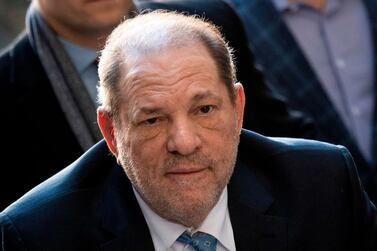Harvey Weinstein was sentenced Wednesday to 23 years in prison for rape and sexual assault, a result the Hollywood mogul's multitude of accusers thought they would never see.
Weinstein, who has been accused of violating scores of women, was convicted last month of raping a woman in a New York City hotel room in 2013 and forcibly performing oral sex on another woman at his apartment in 2006.
He faced a maximum of 29 years in prison.
Both women Weinstein was convicted of assaulting – a once-aspiring actress and a former TV and film production assistant – spoke in court Wednesday before Judge James Burke announced the sentence.
They confronted Weinstein again after their testimony helped to seal his conviction at the landmark #MeToo trial.
The actress Weinstein was convicted of raping in 2013 recalled the moment in the trial when she left the witness stand in tears and could then be heard screaming from an adjacent room.
“The day my screams were heard from the witness room was the day my voice came back to its full power,” she said.
“Rape is not just one moment of penetration. It is forever.”
Weinstein, who has maintained that any sexual any sexual activity was consensual, also spoke in court, saying he had fond memories of his accusers and that he thought they had good friendships.
“I’m not going to say these aren’t great people," he said. "I had wonderful times with these people. I’m just genuinely confused. Men are confused about this issue.”
Mr Burke also heard from Weinstein’s lawyers, who pleaded for leniency because of his age and frail health, and prosecutors, who said the man once celebrated as a titan of Hollywood deserved a harsh sentence that would account for allegations of wrongdoing dating to the 1970s.
Under state law, Mr Burke was able to consider evidence outside the scope of the trial in forming his sentence.
In their sentencing letter, prosecutors outlined 16 examples they said showed Weinstein “trapped women into his exclusive control” so that he could sexually assault them, starting when he was working as a music producer in Buffalo in 1978.
Weinstein was sentenced a week before his 68th birthday and his lawyers argued that a long prison term would, in effect, be a life sentence.
They sought a five-year sentence, the mandatory minimum on the more serious of the two charges on which jurors found him guilty.
Weinstein used a walker throughout the trial and arrived at the courthouse Wednesday in wheelchair because of back problems from a car crash last summer.
He has a condition that requires shots in his eyes and last week had a stent placed to unblock an artery.
The agency that runs New York’s state prisons said every inmate is evaluated to determine which detention centre meets their security, medical, mental health and other needs.
The New York case was the first criminal matter to arise from accusations of more than 90 women, including actresses Gwyneth Paltrow, Salma Hayek and Uma Thurman.
Weinstein was convicted on two counts: criminal sex act for the 2006 assault on the production assistant and rape in the third degree for a 2013 attack on another woman.
On the criminal sex act count, he faced a minimum of five years in prison and a maximum of 25 years, while the third-degree rape count carried a maximum penalty of four years.
He was acquitted of the more serious charges against him of first-degree rape and two counts of predatory sexual assault.
His lawyer, Arthur Aidala, said that after he was convicted Weinstein said: “I’m innocent. I’m innocent. I’m innocent. How could this happen in America?”
Now that he has been sentenced, his lawyers can move forward with his appeal.
His legal team was upset with Mr Burke’s handling of the case, from his inclusion of a juror who had written a novel involving predatory older men to his rulings on evidence, witnesses and objections.
Just as jury selection was about to get under way in January, authorities in Los Angeles announced new, similar charges stemming from allegations against Weinstein.
His lawyers questioned the timing, suggesting it was meant to influence the New York jury pool, and asked Mr Burke to delay the start of jury selection for a “cooling off” period, which he denied.
Weinstein was charged in California with raping a woman at a Los Angeles hotel on February 18, 2013, after pushing his way inside her room, and sexually assaulting a woman in a Beverly Hills hotel suite the next night.
Weinstein could get up to 28 years in prison on the Californian charges of forcible rape, forcible oral copulation, sexual penetration by use of force and sexual battery.
Authorities have not said when he would face those charges.
Three more sexual assault cases under investigation by the LA Police Department and Beverly Hills’ police could mean more charges.
No details have been provided on these cases.






